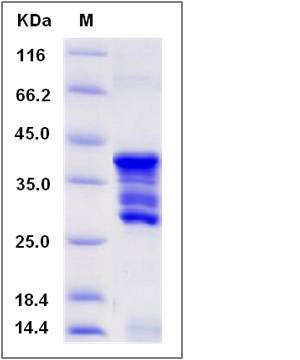Human CD247 / CD3-ZETA Protein (GST Tag)
CD3-ZETA,CD3H,CD3Q,CD3Z,IMD25,T3Z,TCRZ
- 100ug (NPP1988) Please inquiry
| Catalog Number | P13142-H09E |
|---|---|
| Organism Species | Human |
| Host | E. coli |
| Synonyms | CD3-ZETA,CD3H,CD3Q,CD3Z,IMD25,T3Z,TCRZ |
| Molecular Weight | The recombinant human CD247 /GST chimera consists of 347 amino acids and has a predicted molecular mass of 40.2 kDa. It migrates as an approximately 28-43 KDa band in SDS-PAGE under reducing conditions. |
| predicted N | Met |
| SDS-PAGE |  |
| Purity | > 92 % as determined by SDS-PAGE |
| Protein Construction | A DNA sequence encoding the mature form of human CD247 (P20963-1) (Arg52-Arg164) was fused with the GST tag at the N-terminus. |
| Bio-activity | |
| Research Area | Immunology |Adaptive Immunity |T Cell |T Cell CD Antigen |
| Formulation | Lyophilized from sterile PBS, pH 7.4 1. Normally 5 % - 8 % trehalose, mannitol and 0.01% Tween80 are added as protectants before lyophilization. Specific concentrations are included in the hardcopy of COA. |
| Background | CD247, also known as CD3-ZETA, belongs to the CD3Z/FCER1G family. It contains 3 ITAM domains. As a -cell receptor zeta, CD247 forms the T-cell receptor-CD3 complex together with T-cell receptor alpha/beta and gamma/delta heterodimers, and with CD3-gamma, -delta and –epsilon. The zeta chain plays an important role in coupling antigen recognition to several intracellular signal-transduction pathways. Low expression of the antigen results in impaired immune response. Two alternatively spliced transcript variants encoding distinct isoforms have been found for CD247 gene. Defects in CD247 can cause immunodeficiency due to defect in CD3-zeta. An immunological deficiency characterized by T-cells impaired immune response to alloantigens, tetanus toxoid and mitogens. CD247 may play a role in assembly and expression of the TCR complex as well as signal transduction upon antigen triggering. |
| Reference |
